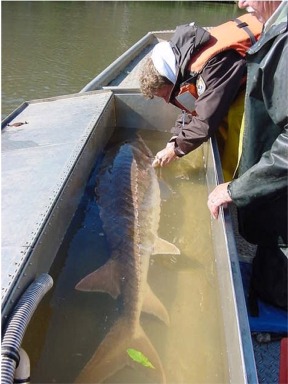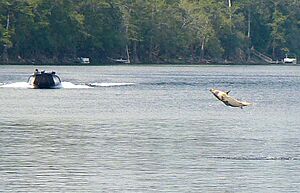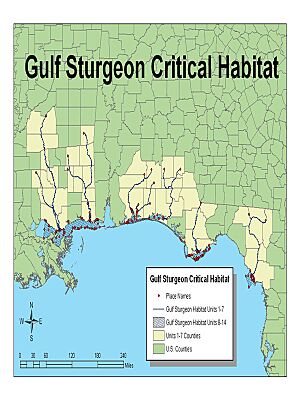Gulf sturgeon facts for kids
Quick facts for kids Gulf sturgeon |
|
|---|---|
 |
|
| Gulf sturgeon on side | |
| Conservation status | |
| Scientific classification |
|
| Kingdom: | Animalia |
| Phylum: | Chordata |
| Class: | Actinopterygii |
| Order: | Acipenseriformes |
| Family: | Acipenseridae |
| Genus: | Acipenser |
| Species: | |
| Subspecies: |
A. o. desotoi
|
| Trinomial name | |
| Acipenser oxyrinchus desotoi Vladykov, 1955
|
|

The Gulf sturgeon (Acipenser oxyrinchus desotoi) is a type of sturgeon fish. It lives in the Gulf of Mexico and in some rivers that flow into it. Scientists first identified the Gulf sturgeon as its own unique kind of fish in 1955.
This fish is closely related to the Atlantic sturgeon. The Gulf sturgeon is currently listed as a threatened species in the United States. This means its population is at risk. Areas where the Gulf sturgeon lives and breeds are protected. These areas are called "critical habitat." Long ago, these sturgeon lived from the Suwannee River in Florida all the way to the Mississippi River. They also lived in the central and eastern parts of the Gulf of Mexico. Other sturgeon species share river homes with the Gulf sturgeon. However, these other sturgeon do not travel between fresh and salt water like the Gulf sturgeon does.
Contents
What Does a Gulf Sturgeon Look Like?
It is very hard to tell the Gulf sturgeon apart from the Atlantic sturgeon just by looking at them. The main difference is inside their bodies. Gulf sturgeon have a longer spleen than Atlantic sturgeon.
There are also small differences in their head size and fin length. Scientists have studied the genes of these sturgeon. This research suggests they became separate types of fish a very long time ago.
How Do Gulf Sturgeon Eat?
Gulf sturgeon have interesting eating habits. Adult Gulf sturgeon mostly eat during the winter. At this time, they are usually in saltwater or brackish water (a mix of fresh and salt water). They eat very little or nothing at all during the rest of the year when they are in rivers.
Because of this, their weight changes a lot. They gain a lot of weight in winter. They lose some weight in summer. Their diet includes shellfish and other creatures that live on the bottom of the sea. These include grass shrimp, marine worms, and small crustaceans.
Life Cycle of the Gulf Sturgeon
Young Gulf sturgeon stay in the river where they were born. They live and eat there until they are about two years old. After that, they start to travel with the adult sturgeon. They follow the same eating patterns.
When Do They Migrate?
Gulf sturgeon travel upriver, away from the ocean, usually between February and April. This happens when the river water gets warmer. They start their journey back downriver in late September or October. This is when the water begins to cool down.
When Do They Reproduce?
Male Gulf sturgeon are ready to have babies when they are between seven and 12 years old. Females are ready between eight and 17 years old. They almost always lay their eggs in the same river where they were born. They usually choose spots with a hard bottom. These spots are often near springs that bring cool groundwater into the river.
After laying eggs, the adult sturgeon and older young sturgeon gather in cooler, deeper parts of the river. These areas usually have slower-moving water. They are often found downstream from springs.
Why Do Gulf Sturgeon Jump?
All kinds of sturgeon sometimes leap out of the water. Gulf sturgeon tend to jump a lot in July and August. They also jump early in their offshore feeding time. Scientists think they jump to talk to each other. It might also help them stay together in groups.
Sturgeon have very hard, bony plates on their bodies. Because of this, a large jumping sturgeon can cause serious injuries to people who are in its way. It is important to be careful if you are on the water where these fish live.
What Controls Gulf Sturgeon Populations?
Scientists do not know much about what animals hunt the Gulf sturgeon, besides humans. They believe other predators do not have a big impact on the sturgeon population.
Sturgeon can have parasites like fish lice, worms, and leeches. However, these parasites do not seem to harm the sturgeon much. Gulf sturgeon also host the young (larvae) of three types of freshwater mussels.
In the past, too much fishing probably hurt the sturgeon populations. Building dams on rivers also likely caused their numbers to drop. Dams can block the sturgeon's path to their spawning grounds.



